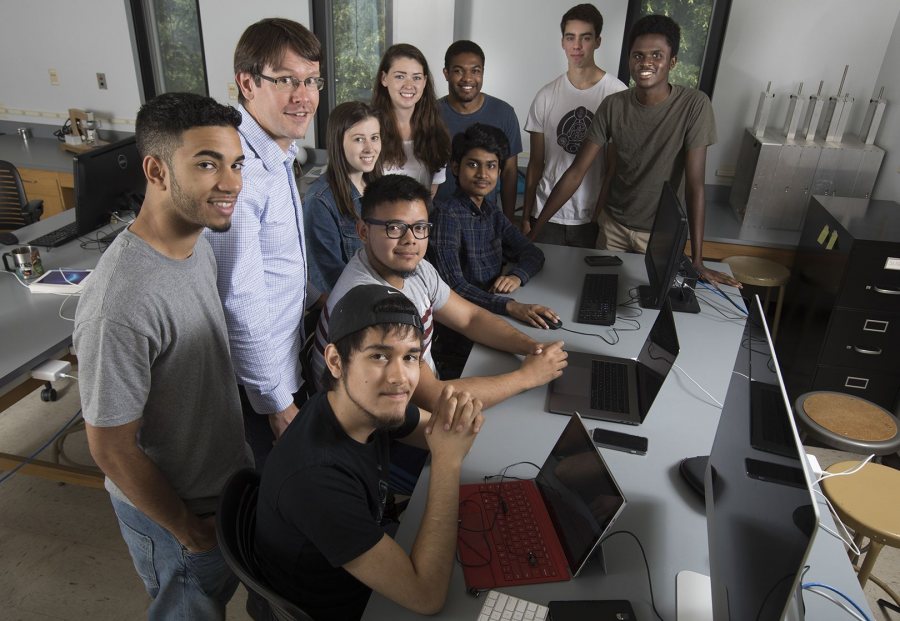STEM Faculty-Student Summer Research Grants
Faculty Application Deadline: 1 February by 11:59 PM
The college has an endowed fund to support student research assistantships (up to 8 each year) in the sciences and math. Funds for this program are awarded to faculty by the Faculty Scholarship Committee. For faculty convenience, only one application is required when seeking support from either or both funds.
STEM fields are defined as sciences and math, including biochemistry, neuroscience and environmental science; and biomedical research, including public health. Bates faculty who wish to hire Bates students as research assistants during the summer may apply for funding through these programs. Preference in funding goes to faculty who engage students from groups traditionally underrepresented in the STEM fields.
NEW FOR 2024: This and related internal awards provide the faculty member with a choice of either professional development funds or personal stipend of $1,000 per student up to a maximum of three such awards (i.e. max of $3,000 per faculty member per summer, across all mechanisms of student support). If the faculty member chooses to receive this money as professional development funds, the funds can be used in support of this project or any other appropriate project within three years; restrictions on use are similar to those outlined for the Bates Faculty Development Fund. If the faculty member chooses to receive this money as a personal stipend, note that this is taxable income subject to that individual’s normal tax rates and rules.
Application Guidelines and Proposal Review
1. Faculty members may submit an application form with abstract, narrative, timetable and budget attached. The proposal must include an abstract and a statement describing the research goals and methodologies, the project timetable with the start- and end-dates of the project (these dates will be used as the basis for the payroll contract), a statement on the specific involvement of the student researcher, and a budget for student wages, supplies and/or travel as applicable. Please write your project description for a general reader.
The faculty PI may apply with a student in mind, or may select the students after having received funding. Student researchers should be rising sophomores, juniors, and seniors. Seniors graduating before the summer research season are not eligible. Preference in funding goes to faculty PIs who have identified students from underrepresented groups as their proposed research assistants.
2. The Committee on Faculty Scholarship reviews proposals, considering the degree of faculty commitment to providing students with genuine research opportunities, and the benefit of the research experience to the student’s college career. If a faculty PI is proposing to hire two student researchers, he or she must offer a compelling justification for needing two rather than one student.
3. If the project is funded and a student has not yet been selected, the faculty PI may conduct his or her own search, or the Dean of the Faculty’s Office can advertise the position on the PI’s behalf, but in either case the faculty PI selects the student researcher.
4. Students hired as STEM student researchers must meet with the faculty PI as soon as possible to finalize the project days and organize payroll. Faculty and students should discuss the scope of the project, the schedule and other details of the work before the student agrees to participate. Students are paid hourly (not to exceed 40 hours per week in the summer). Hours are submitted through the Garnet Gateway; the faculty PI approves the student’s hours.
These grants are competitive; proposals are reviewed by the Committee on Faculty Scholarship. Faculty make only one application; the committee decides the funding source. (Please note: INBRE Faculty-Student Research Grants have different eligibility requirements, so require a separate proposal).
Budget Requirements
Each grant provides funding for student wages (For SUMMER 2025, please budget student wages at $16.00/hour) for up to 40 hours per week for up to eight weeks during the summer. Room and Board fees are extracted from these wages by payroll on a weekly basis. Please consult the Housing Office and Dining for these exact costs. Please calculate the estimated student wages PLUS .0765 to cover the college FICA match (e.g., $1,000 in wages plus FICA match would total $1,076.50). Requests for funding for supplies and travel may not exceed $2,000; please itemize your expenses with specific cost estimates.
Criteria
1. Students may not work more than 40 hours per week on this project and may not hold a fellowship at the same time as they hold a STEM researcher position.
2. STEM student grants are intended to give students an opportunity to engage in long-term, intensive research. Students are expected to work eight to ten weeks full time during the summer (up to 40 hours per week).
3. Because this is a job, all work must be conducted in Maine due to tax implications. Work can be conducted on the Bates campus or remotely, as long as that remote work is done within the state of Maine.
4. The faculty PI must also submit electronically a one-page written evaluation of the student’s work, and comment on the overall success of the project within two weeks of the completion of the project (see reporting requirements).
5. Each STEM student researcher must submit electronically their abstract and report to the PI for approval (see reporting requirements) and to present his/her project during the Back to Bates Summer Research Poster Session if on campus in the fall. Students must also complete the online SURE survey, a national annual study that assesses student research.
6. All future grants are contingent upon receiving these reports.
Reporting Requirements
Final abstracts and reports by both the faculty member and student researcher are a requirement of these grants. Please click here for more comprehensive guidelines on what is needed and when to submit.
Apply Now
Faculty should submit an application form and attach all proposal materials into a single PDF by the deadline listed above.
